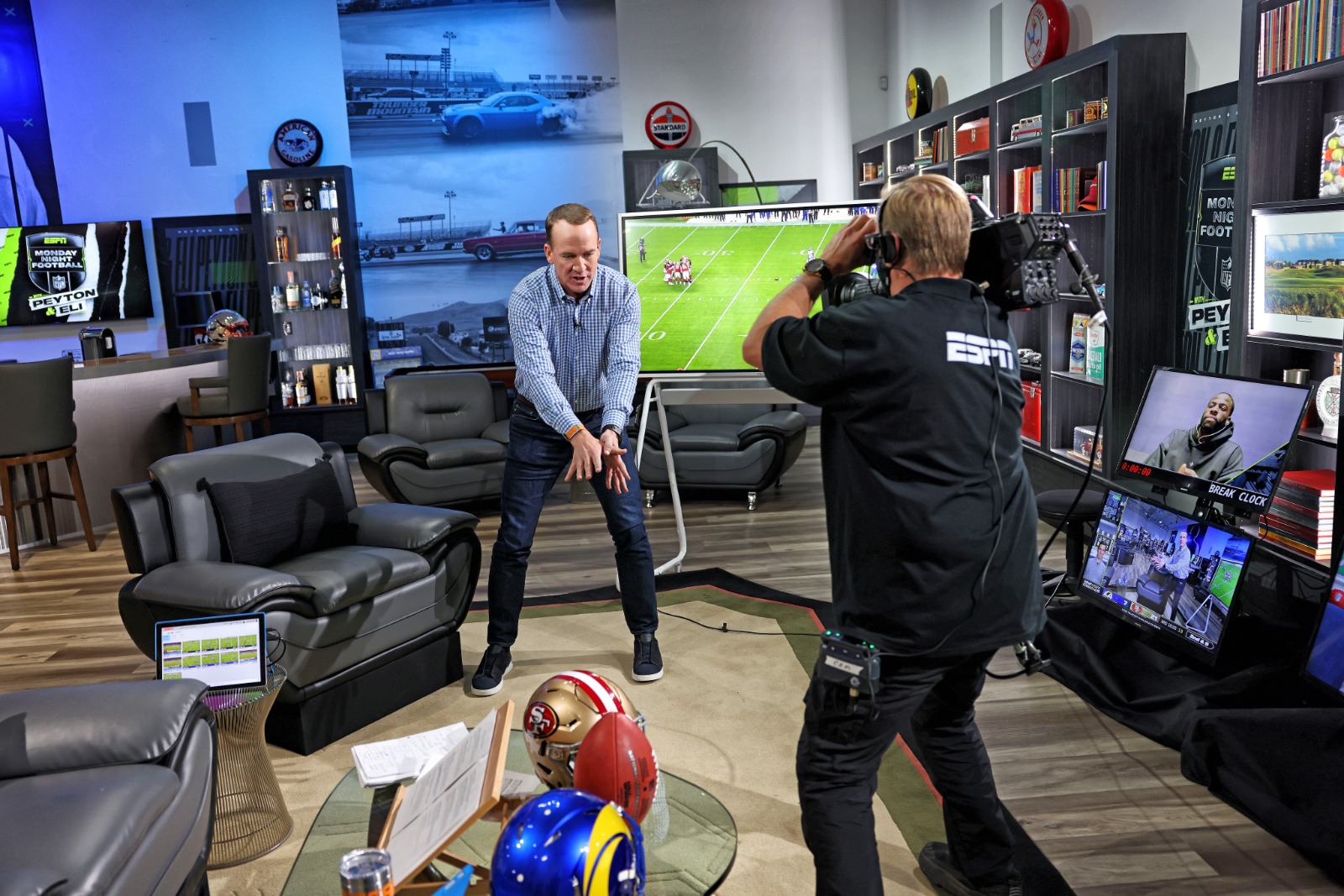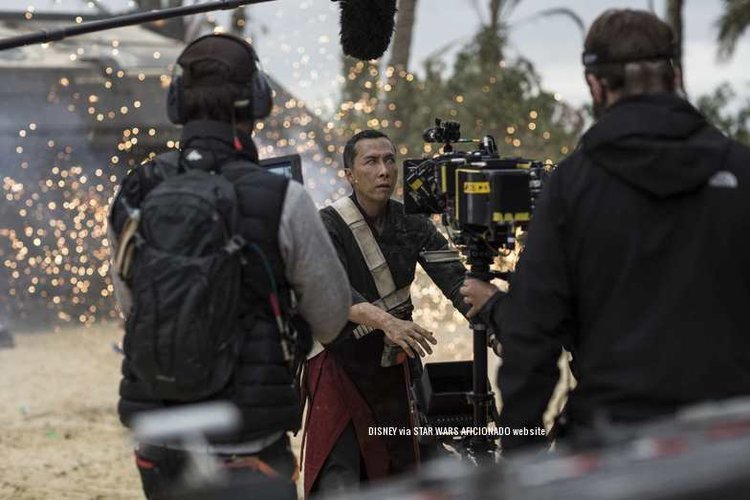Production companies trying to sell shows are finding 2023 to be a difficult year. But a few companies continue to thrive. And amazingly one of them is run by an NFL Hall of Famer who had never run a company before. Peyton Manning’s Omaha Productions has remained one of the hottest companies in media.
Last week it was announced that Manning had sold another show to Netflix – this time teamming up with LeBron James and President Barack Obama to do a docuseries on NBA players (The Obama’s Higher Ground has a first-look deal at Netflix).
Omaha had the hottest show on Netflix this summer, with QUARTERBACK – a show following Patrick Mahomes, Marcus Mariota, and Kirk Cousins throughout the 2023 season. Omaha had previously worked with Netflix on the King of Collectibles: The Goldin Touch, which was recently renewed for a second season.
Omaha Productions was founded by Manning under the guidance of former Fox Sports President Jamie Horowitz and WME agent Josh Pyatt. Focusing initially on sports entertainment, Manning’s company has grown rapidly.
At just two years old, Omaha Productions is valued at nearly half a billion dollars, and it’s already produced hit content for the NFL, Netflix, and ESPN.
Peyton Manning seems to be just as gifted at producing content as he was on the football field. But launching a successful media company is about more than star power—and more than Peyton Manning. What has been the secret to the rise of Omaha?
Below, we’ll break down what makes Omaha Productions a success in sports media today and why its founders—and major content distributors—are betting on its success.
The Rise of Celebrity-Founded Media Companies
We live in the golden age of media production. Anyone with an iPhone 7 can produce their own content and disseminate it online in minutes.
While plenty of average Joes have turned into stars on YouTube and Instagram, celebrities have also started to produce original content to boost their income.
And why wouldn’t they? They’re already famous, so it’s easy for them to generate loads of engagement—and cash. Dwayne Johnson (AKA The Rock) used his fame and charm to quickly climb the ranks of social media, amassing nearly 400M followers. He promoted his work on various platforms, helping him earn more for his acting roles than any other star. And he has created a massive production company, named Seven Bucks.
To be fair, celebrity-run production companies are nothing new. Stars have long produced movies in Hollywood (with traditional studios often footing the bill behind the scenes). But today, content creators are untethered from traditional studios and content distribution channels, making it easier for those with fame to produce content such as movies, shows, and podcasts—and sell it to the highest bidder.
But it takes more than a good reputation and a pretty face to produce good content. Many celebrity-run media brands are still looking for the secret sauce that transforms them from a start-up studio to a media mainstay. Others suffer setbacks—and losses—due to producing mediocre content in an age when audiences have more choices than ever.
Peyton Manning’s media company Omaha Productions may have found the recipe for success.
Omaha Productions: How to Launch a Production Company the Right Way
Some production companies are founded on the idea of providing artists with the means to express themselves. Others want to attract big stars in order to drive viewership. And others try to churn out whatever they think is most in demand, whether it’s reality dating shows or vampire movies.
According to Peyton Manning, these production philosophies lack the discipline to create reliable value and profit. Discipline is something that Manning understands more than most—it takes an immense amount to become possibly the greatest NFL quarterback of all time.
Manning and his advisor Jamie Horowitz have chanelled that discipline into a blitz of innovative new programming and a long-term strategy that aims for the top.
Let’s break down their strategy and their successes.
Disruptive Programming
New production companies need to make a big splash right out of the gate. In other words, they need a hit—fast. However, producing a hit is elusive, as audiences have more viewing options than ever.
Manning knew that he would need to take risks developing new types of programs in order to find his hit—run-of-the-mill sports commentary wouldn’t cut it.
Luckily, he had Jamie Horowitz to help. Horowitz is known as the father of modern sports entertainment. He had already reinvented sports programming once with his debate-style shows that now dominate the sports media airwaves.
He’s behind hits like SportsNation, First Take, Undisputed, The Herd with Colin Cowherd, Numbers Never Lie, and many more.
Horowitz helped Omaha Productions develop disruptive new programming like ManningCast, which features Peyton and Eli Manning commenting on Monday night football from their basements. They call plays, invite celebrity guests to join, and do plenty of goofing off.
This completely unfiltered commentary by two of the world’s best QBs was a massive success, averaging 1.6 million viewers per broadcast in its first season. Even more importantly, ManningCast attracted a younger demographic than traditional sports media—a huge win for Omaha.
Another disruptive hit for Omaha Productions was the Netflix show Quarterback, a fly-on-the-wall documentary following three of the NFL’s biggest quarterbacks as they navigate football season.
Quarterback delivered an unprecedented behind-the-scenes look at some of football’s biggest stars, such as Kansas City Chiefs quarterback Patrick Mahomes. It was a massive success, racking up 21.4 million view hours in its first week while becoming the third most-streamed show on the platform. Season 2 is in the works.
In-Demand Expertise
Peyton Manning has something that other celebrities don’t. While many stars attract viewers due to their acting or musical abilities, Manning also has unrivaled expertise as a sports authority.
As one of the most talented NFL QBs ever to play on the gridiron, viewers choose to watch his content not only because he’s famous but also because he has some of the best insight on sports-related topics.
This is why shows like ManningCast performed so spectacularly. Fans aren’t just tuning in to see Peyton and Eli horse around. They know they’re going to get better play-by-play commentary than any other broadcast can provide.
Celebrity in and of itself wears thin over time. This is why many celebrity-run production companies can’t sustain themselves across many projects and platforms. Expertise on a topic, alternatively, fuels great content and trust from audiences.
The Right Stuff (and Staff)
Much like an effective quarterback, Manning went into the game prepared with a team of content producers who were proven to be the best. The star of the show is advisor Jamie Horowitz, who has created game-changing content for ESPN, Fox Sports, DAZN, HBO, and others. Horowitz helps shape the backbone of innovative programming that sets Omaha Productions’ content apart.
Manning was also able to enlist dozens of incredibly talented producers, commentators, and sports stars like Pat McAfee, John McEnroe, Vince Carter, and of course, his QB brother Eli Manning. And remember, Omaha Productions is just two years old. Manning has gathered a massive pool of talent in a short amount of time and given them the tools the guidance they need to create content that modern audiences demand.
He understands that his own celebrity status is not enough to win over sports fans from across the spectrum. With Omaha’s deep bench of experts and sports names, it’s positioning it to become much more than just “Peyton Manning’s company.”
Hard Work
One reason that celebrity production companies fizzle is that stars think their name alone will attract viewers. However, creating competitive content takes hard work and determination.
Peyton Manning knew this, which is why he initially refused to start the company when it was pitched to him by Jamie Horowitz and Josh Pyatt. He wanted to make sure he could give it 100%—and that it would succeed.
When he finally decided it was time to green-light Omaha Productions, he hit the ground running—and he hasn’t stopped since. For example, Manning personally met with all of the quarterbacks featured on Netflix’s Quarterback to discuss the aims and intentions of the show. He also engaged with the coaching staff who had qualms about camera crews following their players during the season. Without Manning’s groundwork, the show would not exist.
Manning personally appears on many of Omaha Productions’ programs and takes an active role in the production process. One of Omaha’s investors, former president of News Corp. Peter Chernin, had this to say of him:
“I would never underestimate the level of his ambition,” he said. “He’s super impressive, incredibly smart, and incredibly focused. He is one of the most focused people I’ve ever been around.”
Building a Legacy
Failure is not in Manning’s playbook, and he’s giving everything he’s got to turn Omaha Productions into a leading sports media company. While other celebrity-run production companies may earn a few hits, they often lack the scope and foundation to survive in the long term.
It’s certainly true that Manning’s celebrity status plays a big part in the success of Omaha’s content. But Manning understands that this isn’t sustainable. The company’s resilience is built on a solid understanding of audiences, a deep bench of experts, and a commitment to pushing the boundaries with innovative sports content.
Some have predicted a $1 billion valuation for Omaha Productions in the not-so-distant future. Given its remarkable growth over the last two years and its growing list of contracts (including new agreements with The History Channel and Prime Video), that number may prove to be a low bar.






















